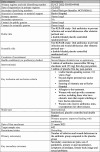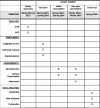The REPAIR study: oral antibiotics to prevent infection and wound dehiscence after obstetric perineal tear-a double-blinded placebo controlled randomized trial
- PMID: 38532503
- PMCID: PMC10967187
- DOI: 10.1186/s13063-024-08069-x
The REPAIR study: oral antibiotics to prevent infection and wound dehiscence after obstetric perineal tear-a double-blinded placebo controlled randomized trial
Abstract
Background: Approximately 85% of women experience an obstetric tear at delivery and up to 25% subsequently experience wound dehiscence and/or infection. Previous publications suggest that intravenous antibiotics administrated during delivery reduces this risk. We do not know if oral antibiotics given after delivery can reduce the risk of wound dehiscence or infection. Our aim is to investigate whether three doses of oral antibiotics (amoxicillin 500 mg/clavulanic acid 125 mg) given after delivery can reduce the risk of wound dehiscence and infection in patients with a second-degree obstetric tear or episiotomy.
Methods: We will perform a randomized, controlled, double-blinded study including 221women in each arm with allocation 1:1 in relation to the randomization. The study is carried out at Department of Obstetrics & Gynecology, Herlev University Hospital, Copenhagen, Denmark. The women will be included after delivery if they have had a second-degree tear or episiotomy. After inclusion, the women will have a clinical follow-up visit after 1 week. The tear and healing will be evaluated regarding signs of infection and/or dehiscence. The women will again be invited for a 1-year clinical examination including ultrasound. Questionnaires exploring symptoms related to the obstetric tear and possible complications will be answered at both visits. Our primary outcome is wound dehiscence and/or wound infection, which will be calculated using χ2 tests to compare groups. Secondary outcomes are variables that relate to wound healing, as pain, use of painkillers and antibiotics, need for further follow-up, as well as outcomes that may be related to the birth or healing process, urinary or anal incontinence, symptoms of prolapse, female body image, and sexual problems.
Discussion: Reducing the risk of wound dehiscence and/or infection would decrease the number of control visits, prevent the need for longer antibiotic treatment, and possibly also decrease both short-term and long-term symptoms. This would be of great importance so the mother, her partner, and the baby could establish and optimize their initial family relation.
Trial registration: The conduction of this study is approved the 2/2-2023 with the EU-CT number: 2022-501930-49-00.
Clinicaltrials: gov Identifier: NCT05830162.
Keywords: Antibiotics; Infection; Obstetric tear; Randomized controlled trial; Women’s health; Wound dehiscence.
© 2024. The Author(s).
Conflict of interest statement
The authors declare that they have no competing interests.
Figures
Similar articles
-
Factors associated with infection after operative vaginal birth-a secondary analysis of a randomized controlled trial of prophylactic antibiotics for the prevention of infection following operative vaginal birth.Am J Obstet Gynecol. 2023 Mar;228(3):328.e1-328.e11. doi: 10.1016/j.ajog.2022.08.037. Epub 2022 Aug 24. Am J Obstet Gynecol. 2023. PMID: 36027955 Clinical Trial.
-
Intravenous co-amoxiclav to prevent infection after operative vaginal delivery: the ANODE RCT.Health Technol Assess. 2019 Oct;23(54):1-54. doi: 10.3310/hta23540. Health Technol Assess. 2019. PMID: 31590702 Free PMC article. Clinical Trial.
-
Obstetric perineal tears: risk factors, wound infection and dehiscence: a prospective cohort study.Arch Gynecol Obstet. 2019 Jul;300(1):67-77. doi: 10.1007/s00404-019-05165-1. Epub 2019 Apr 19. Arch Gynecol Obstet. 2019. PMID: 31004221
-
The incidence of wound infection and dehiscence following childbirth-related perineal trauma: A systematic review of the evidence.Eur J Obstet Gynecol Reprod Biol. 2019 Sep;240:1-8. doi: 10.1016/j.ejogrb.2019.05.038. Epub 2019 Jun 1. Eur J Obstet Gynecol Reprod Biol. 2019. PMID: 31202973
-
Antibiotic prophylaxis for childbirth-related perineal trauma: A systematic review and meta-analysis.PLoS One. 2025 May 9;20(5):e0323267. doi: 10.1371/journal.pone.0323267. eCollection 2025. PLoS One. 2025. PMID: 40344566 Free PMC article.
References
-
- Knight M, Chiocchia V, Partlett C, Rivero-Arias O, Hua X, Hinshaw K, et al. Prophylactic antibiotics in the prevention of infection after operative vaginal delivery (ANODE): a multicentre randomised controlled trial. Lancet North Amer. 2019;393(10189):2395–2403. doi: 10.1016/S0140-6736(19)30773-1. - DOI - PMC - PubMed
Publication types
MeSH terms
Substances
Associated data
LinkOut - more resources
Full Text Sources
Medical



